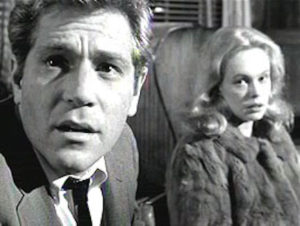In my latest Wall Street Journal “Sightings” column, which appears in the online edition of today’s paper, I comment on a controversy that has the American theater community up in arms. (No, not that one!) Here’s an excerpt.
* * *
 Edward Albee spent most of his long life stirring up theatrical trouble, and he continues to do so eight months after his death. Just last month, the Shoebox Theatre, a small house in Portland, Oregon, was denied performance rights to “Who’s Afraid of Virginia Woolf?” Michael Streeter, the producer, wanted to cast a black actor as Nick, one of the play’s four characters. This went squarely against the script, in which Nick is described as “blond.” (Another character broadly hints that he looks like a Nazi.) In addition, Mr. Albee reportedly said that since the play is set in the early ’60s, a time when mixed-race marriages were uncommon, it was neither logical nor appropriate to cast actors of different races as Nick and Honey, his wife. Result: No show….
Edward Albee spent most of his long life stirring up theatrical trouble, and he continues to do so eight months after his death. Just last month, the Shoebox Theatre, a small house in Portland, Oregon, was denied performance rights to “Who’s Afraid of Virginia Woolf?” Michael Streeter, the producer, wanted to cast a black actor as Nick, one of the play’s four characters. This went squarely against the script, in which Nick is described as “blond.” (Another character broadly hints that he looks like a Nazi.) In addition, Mr. Albee reportedly said that since the play is set in the early ’60s, a time when mixed-race marriages were uncommon, it was neither logical nor appropriate to cast actors of different races as Nick and Honey, his wife. Result: No show….
What is now known as “non-traditional” casting…is both commonplace and generally (if not universally) thought to be a good thing. Not only does the Public Theater’s new Shakespeare in the Park version of “Julius Caesar” feature a woman, Elizabeth Marvel, in the part of Marc Antony, but another New York-based troupe, Pocket Universe, has just opened an all-female production of the same play. Not surprisingly, then, Mr. Albee’s refusal to countenance similar casting of his plays has been widely and passionately criticized as fuddy-duddy at best, crypto-racist at worst….
I’m interested, being a sometime playwright, in ensuring that the rights of any living author to control his own work are fully protected under the law. That is—or should be—a given. But I also agree with the film critic Mark Harris, who broke the “Virginia Woolf” story on Twitter and who has argued in an online essay that “death is, I’d argue, the point at which this aspect of copyright law should cede to a greater social and artistic good….It’s hard to imagine a playwright’s work long surviving him if it’s shackled to the unexamined enforcement of questionable decisions from another era, or constrained by the terror that it might be mishandled.”
No small part of the burgeoning vitality of modern-day Shakespeare productions, after all, lies in the freshness and immediacy that can be fostered by genuinely imaginative non-traditional casting (as opposed to the rigidly political kind). By far the best “Julius Caesar” I’ve ever reviewed, directed by Amanda Dehnert at the Oregon Shakespeare Festival in 2011, was a modern-dress production that featured a woman actor, Vilma Silva, in the title role. And while “Virginia Woolf” still feels fresh and immediate, a time will come—perhaps soon, maybe even now—when it will profit from an equally new spin….
* * *
Read the whole thing here.
The trailer for Mike Nichols’ 1966 film version of Who’s Afraid of Virginia Woolf?
